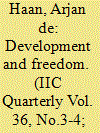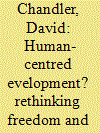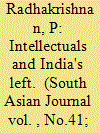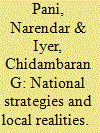| Srl | Item |
| 1 |
ID:
128503


|
|
|
| 2 |
ID:
091961


|
|
|
|
|
| Publication |
2009.
|
| Summary/Abstract |
The literature on economic development is long and rich, but until the late 1970s no one challenged the standard conception of development, a model focused on raising percapita incomes and the simple transformation of economies from an agrarian to an industrial base. In recent decades, inspired by the pioneering work of Mahbub ul Haq and Amartya sen, economists increasingly have argued that development involves much more.
|
|
|
|
|
|
|
|
|
|
|
|
|
|
|
|
| 3 |
ID:
124617


|
|
|
|
|
| Publication |
2013.
|
| Summary/Abstract |
Today's dominant discourses of international development increasingly focus on human agency as the measure of development in terms of individual capabilities. The individualised understanding of development takes a 'human-centred' or 'agent-orientated' view of the barriers to development. This article seeks to critically engage with the view of the human and of human agency articulated within this approach. In this discourse, development is taken out of a macro-political-economy context, in which development policies are shaped by social and political pressures or state-led policies. Foucault's insights on the rearticulation of power - shifting from the state-based, sovereign and disciplinary approaches of government ruling over society, towards the biopolitical or 'human-centred' approaches of governance through social processes - will be used to critically engage with the capabilities approach. This article genealogically draws out the changing nature of Western discourses of development and the understanding of policy practices as promoting the empowerment of the post-colonial other in order to examine how development and autonomy have been radically differently articulated in discourses of Western power and how today's discursive framing feeds on and transforms colonial and early post-colonial approaches to the human subject.
|
|
|
|
|
|
|
|
|
|
|
|
|
|
|
|
| 4 |
ID:
105933


|
|
|
|
|
| Publication |
2011.
|
| Summary/Abstract |
In this article I want to put forward an intellectual defence of the political discourse of dialogue of civilisations by challenging the idea that 'civilisation-based thinking' is necessarily a conflict-generating factor and arguing that, contrary to fashionable assumptions, a civilisational dialogue that wants to contribute to a more peaceful world order requires, in a qualified way, 'stronger' civilisational identities. In particular, I take issue with the academic criticisms to dialogue of civilisations coming from the camp of the critique of the clash of civilisations and well represented by Amartya Sen's explicit and Edward Said's more indirect critiques to 'civilisation-based thinking': by unveiling their implicit endorsement of the Westphalian/secularist presumption, I will show the counter-intuitive political implications of a dialogue among 'strong' civilisational identities and traditions when framed hermeneutically as 'fusion of horizons'. Finally I provide a supplementary brief illustration to my defence of dialogue of civilisations by criticising Said's reading of Louis Massignon - the great 20th century French scholar of Islam - as part of Orientalism and suggesting that 'in diverging agreement' with Said, Massignon's work and life stand as a very concrete proof of the possibility of a 'dialogue of civilisations' that escapes the yoke of the Orientalist accusations.
|
|
|
|
|
|
|
|
|
|
|
|
|
|
|
|
| 5 |
ID:
123686


|
|
|
| 6 |
ID:
134103


|
|
|
|
|
| Publication |
2012.
|
| Summary/Abstract |
The article presents a critical evaluation of the concepts of human development and weak statehood and outlines the relationship between them. It is argued that weak statehood has a very significant impact on the success of development strategies even if they stem from human development goals. For example, weak statehood has a direct effect on the provision or non-provision of public goods by the state. Therefore, connecting these concepts provides a perspective for analyzing various issues linked to implementation of development strategies. In conclusion, the article presents the concept of 'functional networking' as a tool for development in the anarchic environment of weak statehood. Functional networking is based on placing unmistakable emphasis on the development of individuals (daily livelihood of families), acceptance of Amartya Sen's condition of the freedom of individuals in terms of decision and opportunity, and the involvement of civil society.
|
|
|
|
|
|
|
|
|
|
|
|
|
|
|
|
| 7 |
ID:
112108


|
|
|
|
|
| Publication |
2012.
|
| Summary/Abstract |
Despite sporadic attention paid to the case for "shock therapy," the conceptualization of the implementation stage of policy making does not always get the attention it deserves. As a result there is inadequate understanding of the precise role this conceptualization plays in the transformation of a policy initiative into practice. This article draws on some of the insights of Amartya Sen, in another context, to identify different approaches to the conceptualization of the implementation of policy initiatives. It goes on to explore the consequences of using what we have termed the Greenfield approach in a reality marked by diversity in social, economic and political relations. It does so using the experience of the working of the Mahatma Gandhi National Rural Employment Guarantee Scheme in the south Indian state of Karnataka.
|
|
|
|
|
|
|
|
|
|
|
|
|
|
|
|